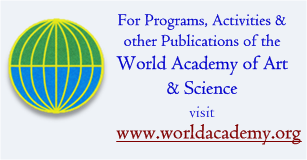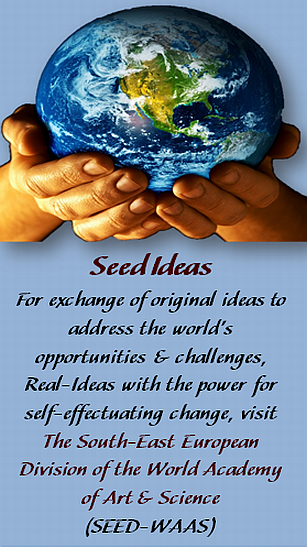The individual is the most complex and marvelous product of natural and social evolution with unlimited capacity for further development – physically, socially, emotionally, mentally and spiritually... Read more
The emerging individual is less deferential to the past and more insistent on his or her rights; less willing to conform to regimentation, more insistent on freedom and more tolerant of diversity...Read more
The tremendously wasteful underutilization of precious human resources and productive capacity is Greece’s most serious problem and also its greatest opportunity... Read more
Given the remarkable progress of humanity over the past two centuries, the persistence of poverty might not be so alarming, were it not for the persistent poverty of new ideas and fresh thinking on how to eliminate the recurring crises .... Read more
At the root of the current crisis is not subprime mortgages, credit rating agencies, financial institutions or central banks. It is the Great Divorce between finance and economy, which is a subset of the widening precipice between economy and human welfare... Read More
Focusing on growth of the part without reference to its impact on the whole is a formula for social disease... Read More
The very possession of nuclear weapons violates the fundamental human rights of the citizens of the world and must be regarded as illegal.... Read more
The Original thinker seeks not just ideas but original ideas which are called in Philosophy Real-Ideas. Cadmus Journal refers to them as Seed-Ideas. Ideas, sooner or later, lead to action. Pregnant ideas have the dynamism to lead to action. Real-Ideas are capable ... Read more
The political unification of the world will have to be the result of an inner revolution, a conscious evolutionary act carried out by humanity.... Read more
There is a widespread perception that many governments have used unemployment as a way to contain inflation. Surely inflation is bad, but the social costs of unemployment are much worse... Read more
Uncertainty and security are not contradictory or mutually exclusive concepts. They are really complements and the interaction between them represents a virtually unlimited source for wealth creation.... Read more
The evolution from physical violence to social power to authorized competence and higher values is an affirmation of the value basis of law... Read more
The economics of growth must be replaced by equilibrium economics, where considerations of ecology, carrying capacity, and sustainability are given proper weight, and where the quality of life of future generations has as much importance as present profits... Read more
Following the financial crisis, there is a new and stronger awareness that an overhaul of global governance – at least as far as economic and financial markets ... Read more
The economics of growth must be replaced by equilibrium economics, where considerations of ecology, carrying capacity, and sustainability are given proper weight, and where the quality of life of future generations has as much importance as present profits.... Read more
The clearing house should encourage thinking ahead so that law and governance can attempt to accommodate the numerous challenges of globalization, many new technologies, and the emerging ....Read more
We propose that a new organisation be set up, perhaps called the ‘World Community for Food Reserves’.... Read more
A proper and well accepted definition of misconduct, reliable means of identification, and effective corrective actions deserve a high priority on the agenda of research institutes, universities ... Read more
A strong and strategic knowledge system is essential for identifying, formulating, planning and implementing policy-driven actions while maintaining ... Read more
Download Issue 4

|
Human Capital
Editorial
Society is a teeming ocean of human energies and capacities, unorganized but latent with unlimited productive potential. The organization of social energies and capacities converts social potential into Social Capital. Each member of society is a microcosm of human potential - an unorganized reservoir of energies, aspirations ... Read More
|
Original Thinking
Ashok Natarajan
History that comes to us as a chronology of events is really a collective existence that is evolving through several stages to develop Individuality in all members of the society. The human community, nation states, linguistic groups, local castes and classes, and families are the intermediate stages in development of the Individual. The social ... Read More
|
|
Simulated ICJ Judgment
Winston P. Nagan
The author prepared this simulated judgment at the request of Cadmus editors to demonstrate that there is ample ground for revisiting and revising the landmark 1996 advisory opinion of the ICJ on the legality of nuclear weapons. The ICJ failed to anticipate the proliferation of nuclear weapons, which expands the evolution of the concept of sovereignty ... Read More
|
Inclusive Growth: Why is it Important for Developing Asia?
Jesus Felipe
Although Asian countries attain relatively high growth rates of GDP, many citizens do not seem to benefit from it. To remedy this problem, multilateral development institutions have developed the concept of inclusive growth, defined as growth that allows all members of a society to participate ... Read More
|
|
From Limits to growth to Limitless Growth
Garry Jacobs & Ivo Šlaus
The publication of the Club of Rome's landmark report 'The Limits to Growth' in 1972 shook the intellectual foundations of social theory and challenged the very premises on which modern economy and prosperity are based. Once set in motion, it led to a revolutionary re-evaluation of human aspirations ... Read More
|
Getting Risks Right
Patrick M. Liedtke
The extraordinary extent of the financial crisis has inspired deep systemic reforms world-wide, rethinking financial stability, the resilience of our economic systems, and the role that national and international institutions play. While most of the ongoing activities are understandably centred on banks and the banking sector - the origin & centre of crisis...
Read More
|
|
Flaws in the Concept of Nuclear Detterence
John Avery
The concept of nuclear deterrence is seriously flawed, and it violates the fundamental ethical principles of all major religions. Besides being morally unacceptable, nuclear weapons are also illegal according to a historic 1996 decision of the International Court of Justice, a ruling that reflects the opinion of the vast majority of the world's peoples ... Read More
|
Research Integrity
Pieter J. D. Drenth
Research misconduct is a serious threat to science and to society. A variety of Codes of Conduct for research integrity have been developed in Europe by universities, academies of sciences and funding organisations, but this has resulted in a patchwork of codes and procedures, which hampers international collaborative research. ALLEA and ESF...
Read More
|
|
Social Evolution, Global Governance & a World Parliament
Andreas Bummel
This article describes the relevance of a world parliament in the context of long-term social evolution and the crisis of global governance. It is argued that due to the development of weapons of mass destruction and complex interdependency, war has ceased to be a driver of socio-evolutionary ... Read More
|
Law in Transition Biblioessay
Michael Marien
As globalization continues, many transformations in international and domestic laws are underway or called for. There are too many laws and too few, too much law that is inadequate or obsolete, and too much law-breaking. This biblioessay covers some 100 recent books, nearly all recently published, arranged in four categories 1) International Law includes six overviews/textbooks on comparative law ... Read More
|
|
New Paradigm for Global Rule of Law
Winston P. Nagan & Garry Jacobs
Law is both a condition and a consequence of social development, an outcome of the broader social process, a form of social organization which channels social energies based on the relative strength of past practice and precedent, the present balance of power and emerging social values. Values are the bedrock of social process ... Read More
|
From European Union to World Union
John McClintock
Sovereignty-sharing has placed European countries in a position to resolve their common problems through law, not war. As a result, the EU member states now live in peace together and take peace, justice and order for granted. The system of global governance is dysfunctional - some states are failing & the Security Council ... Read More
|
|
Entropy and Economics
John Scales Avery
In this essay, human society is regarded as a "superorganism", analogous to colonies of social insects. The digestive system of the human superorganism is the global economy, which ingests both free energy and resources, and later excretes them in a degraded form. This process involves an increase in entropy. Early in the 20th century, both Frederick Soddy and Nicholas Georgescu-Roegen ... Read More
|
Gender Perspectives on Climate Change & Human Security in India
Jyoti Parikh et al
Women play a crucial role in many activities essential for coping with climate change. Indian women appear to be more vulnerable than men to differential impacts of climate change because they share most of the household managing responsibilities but have limited ... Read More
|
|
|




